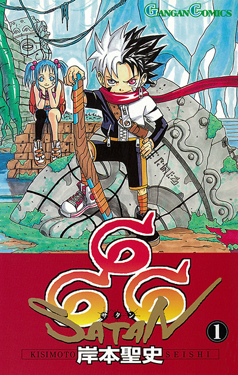Pulp magazines were inexpensive fiction magazines that were published from 1896 until around 1955. The term "pulp" derives from the cheap wood pulp paper on which the magazines were printed. In contrast, magazines printed on higher-quality paper were called "glossies" or "slicks". The typical pulp magazine had 128 pages; it was 7 inches (18 cm) wide by 10 inches (25 cm) high, and 0.5 inches (1.3 cm) thick, with ragged, untrimmed edges. Pulps were the successors to the penny dreadfuls, dime novels, and short-fiction magazines of the 19th century.

Archie Comic Publications, Inc., is an American comic book publisher headquartered in Pelham, New York. The company's many titles feature the fictional teenagers Archie Andrews, Jughead Jones, Betty Cooper, Veronica Lodge, Reggie Mantle, Sabrina Spellman, Josie and the Pussycats and Katy Keene. The company is also known for its long-running Sonic the Hedgehog comic series, which it published from 1992 until 2016.

Vertigo Comics was an imprint of American comic book publisher DC Comics started by editor Karen Berger in 1993. Vertigo's purpose was to publish comics with adult content, such as nudity, drug use, profanity, and graphic violence, that did not fit the restrictions of DC's main line, thus allowing more creative freedom. Its titles consisted of company-owned comics set in the DC Universe, such as The Sandman and Hellblazer, and creator-owned works, such as Preacher, Y: The Last Man and Fables.

Kevin Llewellyn Callan, better known as Stewart Home, is an English artist, filmmaker, writer, pamphleteer, art historian, and activist. His novels include the non-narrative 69 Things to Do with a Dead Princess (2002), and the re-imagining of the 1960s in Tainted Love (2005). Earlier parodistic pulp fictions work includes Pure Mania, Red London, No Pity, Cunt, and Defiant Pose which pastiche the work of 1970s British skinhead pulp novel writer Richard Allen and combine it with pornography, political agit-prop, and historical references to punk rock and avant-garde art.

HarperCollins Publishers LLC is an Anglo-American publishing company that is considered to be one of the "Big Five" English-language publishers, along with Penguin Random House, Hachette, Macmillan, and Simon & Schuster. HarperCollins is headquartered in New York City and is a subsidiary of News Corp.

Tor Books is the primary imprint of Tor Publishing Group, a publishing company based in New York City. It primarily publishes science fiction and fantasy titles.

Simon & Schuster LLC is an American publishing company owned by Kohlberg Kravis Roberts. It was founded in New York City on January 2, 1924, by Richard L. Simon and M. Lincoln Schuster. Along with Penguin Random House, Hachette, HarperCollins and Macmillan Publishers, Simon & Schuster is considered one of the 'Big Five' English language publishers. As of 2017 Simon & Schuster was the third largest publisher in the United States, publishing 2,000 titles annually under 35 different imprints.

Lesbian pulp fiction is a genre of lesbian literature that refers to any mid-20th century paperback novel or pulp magazine with overtly lesbian themes and content. Lesbian pulp fiction was published in the 1950s and 1960s by many of the same paperback publishing houses as other genres of fiction, including westerns, romances, and detective fiction. Because very little other literature was available for and about lesbians at this time, quite often these books were the only reference the public had for modeling what lesbians were. English professor Stephanie Foote commented on the importance of lesbian pulp novels to the lesbian identity prior to the rise of organized feminism: "Pulps have been understood as signs of a secret history of readers, and they have been valued because they have been read. The more they are read, the more they are valued, and the more they are read, the closer the relationship between the very act of circulation and reading and the construction of a lesbian community becomes…. Characters use the reading of novels as a way to understand that they are not alone." Joan Nestle refers to lesbian pulp fiction as “survival literature.” Lesbian pulp fiction provided representation for lesbian identities, brought a surge of awareness to lesbians, and created space for lesbian organizing leading up to Stonewall.

The New American Library is an American publisher based in New York, founded in 1948. Its initial focus was affordable paperback reprints of classics and scholarly works as well as popular and pulp fiction, but it now publishes trade and hardcover titles. It is currently an imprint of Penguin Random House; it was announced in 2015 that the imprint would publish only nonfiction titles.

O-Parts Hunter, known as 666 Satan in Japan, is a Japanese manga series written and illustrated by Seishi Kishimoto. It was originally published by Enix, who later became Square Enix, in their Monthly Shōnen Gangan magazine from August 2001 to December 2007, with the chapters collected into 19 tankōbon volumes. The series draws heavily from Kabbalistic traditions and Judeo-Christian demonology for its plot, and less so on Japanese folklore. 666 Satan has been released internationally in Spain, France, Italy and North America, although, Viz Media changed the title to O-Parts Hunter in the latter.

Fiction House was an American publisher of pulp magazines and comic books that existed from the 1920s to the 1950s. It was founded by John B. "Jack" Kelly and John W. Glenister. By the late 1930s, the publisher was Thurman T. Scott. Its comics division was best known for its pinup-style good girl art, as epitomized by the company's most popular character, Sheena, Queen of the Jungle.
Robert Edward Weinberg was an American author, editor, publisher, and collector of science fiction. His work spans several genres including non-fiction, science fiction, horror, and comic books.

Avon Publications is one of the leading publishers of romance fiction. At Avon's initial stages, it was an American paperback book and comic book publisher. The shift in content occurred in the early 1970s with multiple Avon romance titles reaching and maintaining spots in bestseller lists, demonstrating the market and potential profits in romance publication. As of 2010, Avon is an imprint of HarperCollins.
Jove Books, formerly known as Pyramid Books, is an American paperback and eBook publishing imprint, founded as an independent paperback house in 1949 by Almat Magazine Publishers. The company was sold to the Walter Reade Organization in the late 1960s. It was acquired in 1974 by Harcourt Brace which renamed it to Jove in 1977 and continued the line as an imprint. In 1979, they sold it to The Putnam Berkley Group, which is now part of the Penguin Group.

Dell Publishing Company, Inc. is an American publisher of books, magazines and comic books, that was founded in 1921 by George T. Delacorte Jr. with $10,000, two employees and one magazine title, I Confess, and soon began turning out dozens of pulp magazines, which included penny-a-word detective stories, articles about films, and romance books.
Ace Magazines was a comic book and pulp-magazine publishing company headed by Aaron A. Wyn and his wife Rose Wyn. The Wyns had been publishing pulp fiction under the Periodical House and A. A. Wyn's Magazine Publishers names since 1928, and published comics between 1940 and the end of 1956.
Obverse Books is a British publisher initially known for publishing books relating to the character Iris Wildthyme, and currently for the Black Archive series of critical books on Doctor Who, and two sister series - the Gold Archive, focusing on Star Trek, and the Silver Archive, featuring other genre shows. The company also owns publishing rights for stories based on Faction Paradox, and previously held the license to Sexton Blake. Obverse Books had an e-book only imprint named Manleigh Books between 2012 and 2016.

Archie Horror is an imprint of Archie Comics Publications, Inc. focusing on the company's horror-related titles. Prior to the creation of the imprint the titles were published under the normal Archie Comics banner.
Columbia Publications was an American publisher of pulp magazines featuring the genres of science fiction, westerns, detective stories, romance, and sports fiction. The company published such writers as Isaac Asimov, Louis L'Amour, Arthur C. Clarke, Randall Garrett, Edward D. Hoch, and William Tenn; Robert A. W. Lowndes was an important early editor for such writers as Carol Emshwiller, Edward D. Hoch and Kate Wilhelm.












